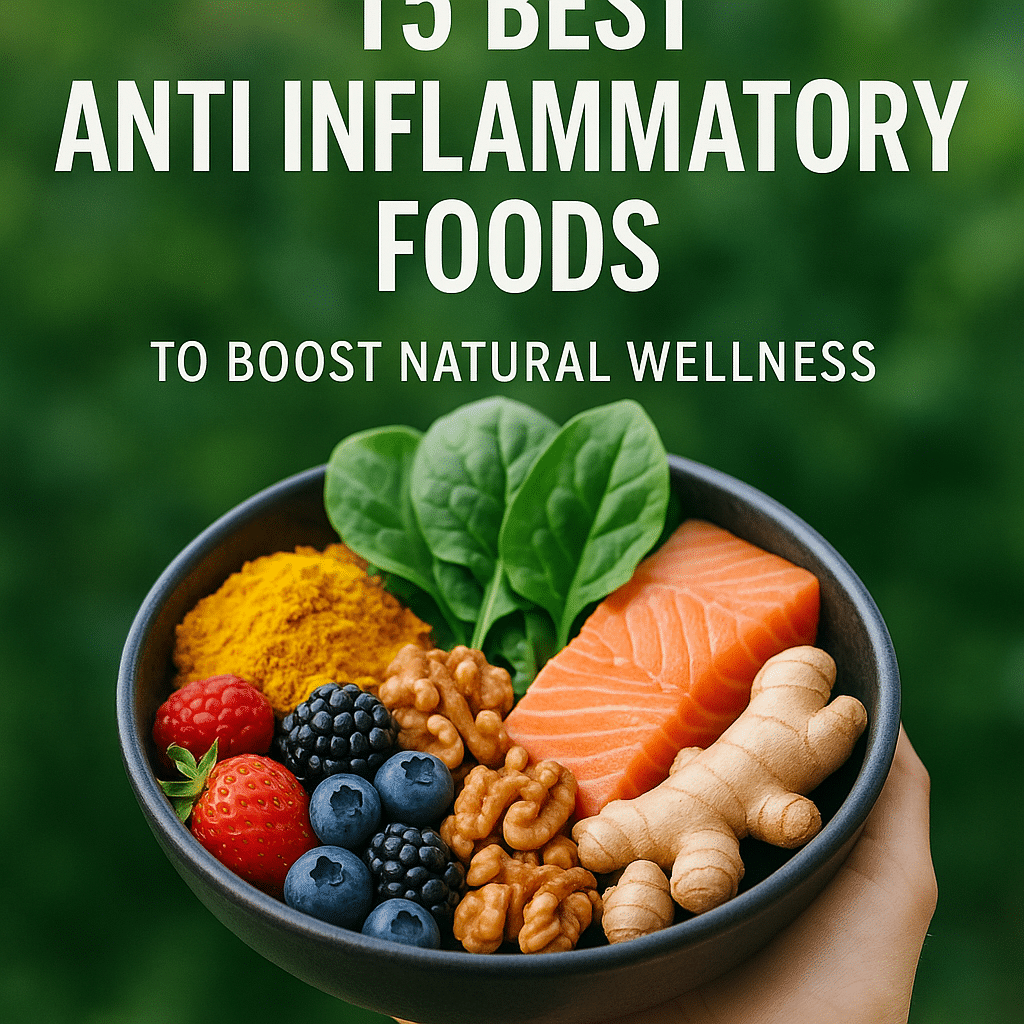Inflammation—it’s a buzzword these days, but understanding it is key to unlocking better health through diet. As health-conscious adults seeking natural wellness, you might already be familiar with how chronic inflammation can quietly wreak havoc on your body, contributing to joint pain, arthritis, heart issues, and even skin problems. The good news? Nature provides us with powerful tools in the form of the best anti inflammatory foods that can help combat this pervasive enemy.
In this article, I’ll take you on a detailed journey into the world of inflammation, revealing its causes, consequences, and, most importantly, how certain foods can play an instrumental role in managing and reducing it. From fatty fish rich in omega-3 fatty acids to vibrant berries bursting with antioxidants, I’ll explore 15 top picks that are not only delicious but also scientifically proven to support your body’s natural wellness. You’ll also discover how to incorporate these anti-inflammatory powerhouses into your daily meals, which foods to avoid, and the lifestyle habits that complement this healing approach.
So, whether you’re looking to ease joint pain, maintain heart health, or simply enjoy a radiant, energetic life, let’s dive in and explore the best anti inflammatory foods that nature has to offer.
Understanding Inflammation: Causes and Consequences
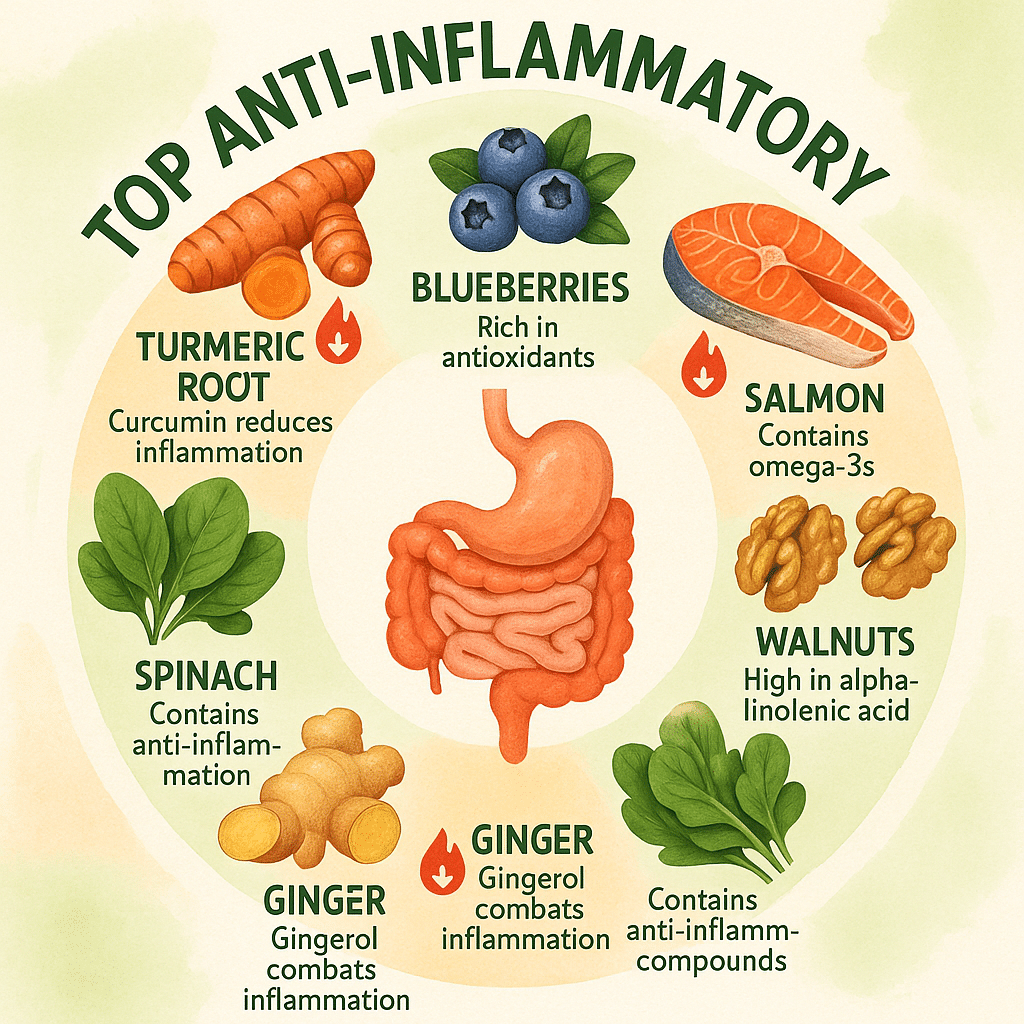
What Is Chronic Inflammation and Why It Matters
Inflammation is your body’s natural defense mechanism. It’s a critical immune response designed to protect you from injuries and infections. When you get a cut or sprain a muscle, acute inflammation kicks in, causing redness, heat, swelling, and pain to help heal the affected tissue. This type of inflammation is temporary and beneficial.
However, chronic inflammation is a different story. It’s a slow, persistent inflammatory response that can last for months or even years. Think of it as your body’s alarm system stuck in the “on” position—this constant low-grade inflammation is like having a smoldering fire inside. Over time, it can damage tissues and organs, leading to chronic diseases such as arthritis, cardiovascular disease, diabetes, and some cancers.
Research shows that chronic inflammation is often driven by poor diet, sedentary lifestyle, stress, and environmental toxins. The challenge is mitigated when you introduce the best anti inflammatory foods to your plate, which help to calm that internal fire and keep those harmful processes in check.
How Diet Influences Inflammation and Overall Health
Nothing impacts inflammation more directly than what you put into your body daily. The foods you eat can either fan the flames of inflammation or help extinguish them. Diets high in processed sugars, trans fats, and refined carbohydrates stimulate the production of pro-inflammatory compounds. Conversely, an inflammation-reducing diet is rich in natural, whole foods loaded with antioxidants, healthy fats, fiber, vitamins, and minerals.
Scientific studies consistently highlight diets resembling the Mediterranean model—rich in fruits, vegetables, nuts, whole grains, and healthy fats—as particularly effective in reducing inflammation. This approach doesn’t just tone down inflammation; it supports your overall health, including your heart, brain, joints, and skin.
By choosing the best anti inflammatory foods for daily consumption, you’re embracing a powerful, natural strategy that supports your body’s innate healing processes, reduces chronic inflammation, and enhances your quality of life.
Key Nutrients in Anti Inflammatory Foods
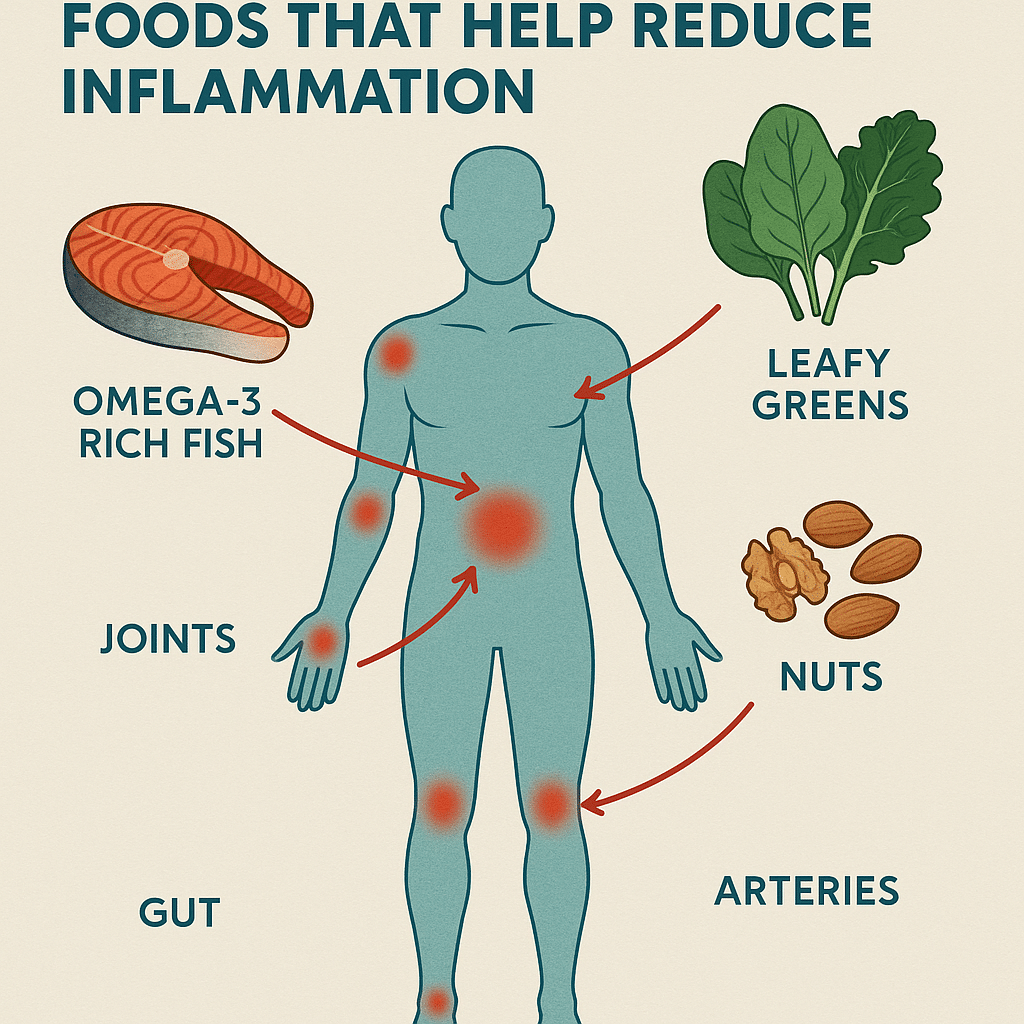
The Role of Omega-3 Fatty Acids in Reducing Inflammation
Omega-3 fatty acids, found primarily in fatty fish like salmon, mackerel, and sardines, are superstar nutrients when it comes to battling inflammation. They help reduce the production of inflammatory molecules such as cytokines and eicosanoids. Omega-3s also support the health of your cell membranes, ensuring proper communication and immune function.
Aside from fish oils, plant sources like flaxseeds and walnuts provide alpha-linolenic acid (ALA), a plant-based omega-3 fatty acid that can partially convert in the body into EPA and DHA, the biologically active forms found in fish.
Including omega-3-rich foods in your diet regularly is a cornerstone step in managing chronic inflammation naturally—and they’re also great for brain health, heart health, and even mood support.
Antioxidants: Vitamins A, C, and E in Fighting Oxidative Stress
Oxidative stress is a major player in chronic inflammation, caused by an excess of free radicals damaging cells and tissues. Antioxidants step in to neutralize these free radicals and reduce inflammation.
Vitamins A, C, and E are potent antioxidants found abundantly in colorful fruits, vegetables, and nuts. Vitamin A supports skin and mucous membrane health, which are your first-line defenses against infections. Vitamin C contributes to immune function and collagen synthesis for joint and skin health, while vitamin E protects cell membranes from oxidative damage.
Foods like carrots, sweet potatoes, oranges, berries, spinach, and almonds are excellent sources of these vitamins. Eating a variety of these antioxidant-rich foods daily can help reduce your body’s inflammatory load.
Polyphenols and Their Benefits for Inflammation
Polyphenols are naturally occurring compounds found in plant-based foods, renowned for their anti-inflammatory and antioxidant effects. Green tea, berries, olives, dark chocolate, and colorful vegetables are brimming with polyphenols.
These compounds work by modulating immune cell activity, reducing cytokine production, and scavenging harmful free radicals. The polyphenol content in a food often determines its capacity to dampen inflammation.
Including polyphenol-rich foods in your diet—like green tea and berries—can significantly boost your natural defenses against chronic inflammation and contribute to overall wellness.
Top 15 Best Anti Inflammatory Foods to Eat Daily
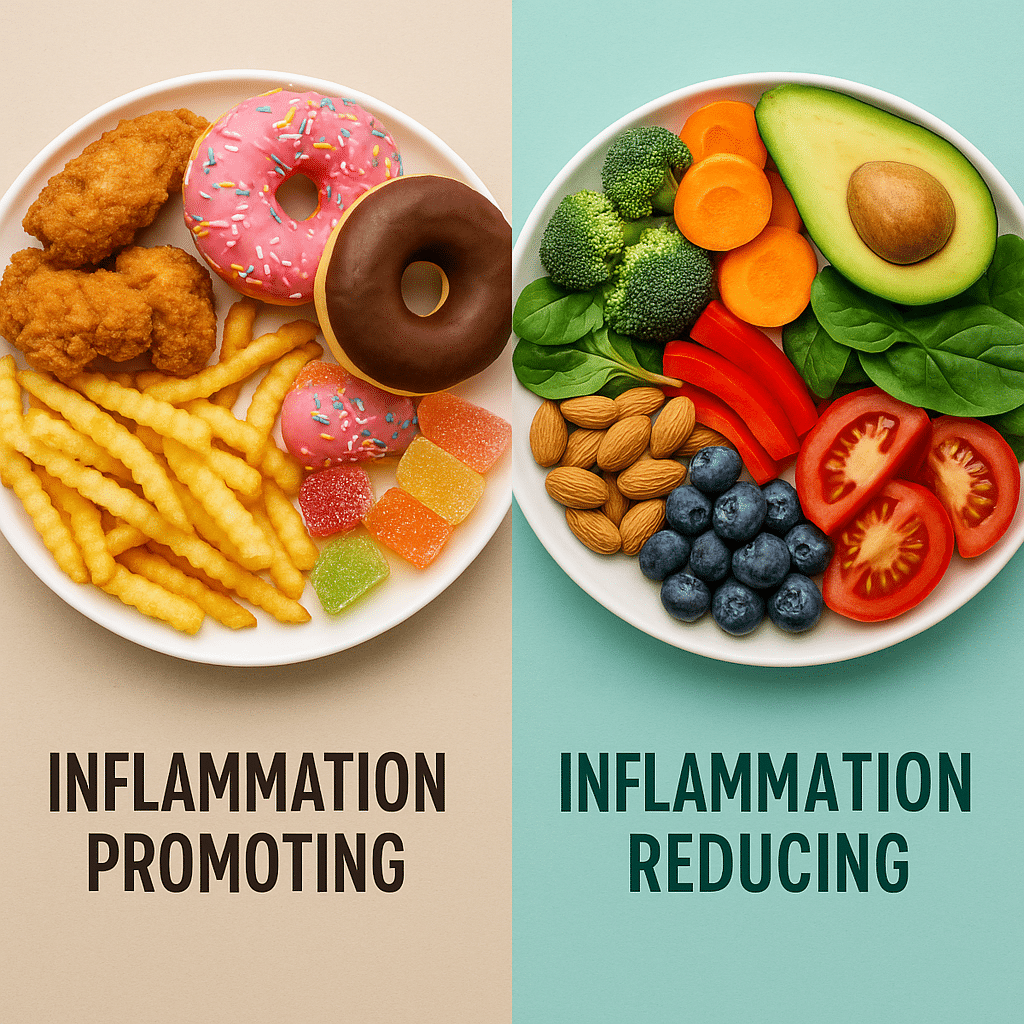
Let’s get down to the fun part—what should you be eating? Here’s my carefully curated list of the best anti inflammatory foods based on scientific research and real-world benefits.
1. Fatty Fish: Salmon, Mackerel, and Sardines
Thanks to their high omega-3 fatty acid content, these fish are among the best anti inflammatory foods for heart health, brain health, and joint pain relief. Eating fatty fish 2–3 times per week can lower inflammatory markers significantly.
Wild-caught salmon is highly recommended for its purity and sustainability. Mackerel and sardines are also excellent options and often budget-friendly.
2. Berries: Blueberries, Strawberries, and Raspberries
Berries pack a punch with powerful antioxidants called anthocyanins and vitamin C, helping reduce inflammation and oxidative stress. They’re also a natural anti inflammatory food for skin, improving complexion and reducing redness.
A cup of mixed berries daily is a delicious way to keep inflammation in check.
3. Leafy Greens: Spinach, Kale, and Swiss Chard
Leafy greens are anti inflammatory foods rich in vitamins A, C, K, and minerals like magnesium and calcium. They contain polyphenols and carotenoids that reduce inflammation and support gut health.
Try incorporating them fresh in salads, or lightly sautéed for dinner.
4. Nuts and Seeds: Walnuts, Almonds, and Flaxseeds
These are nutritional powerhouses loaded with healthy fats, fiber, and antioxidants. Walnuts and flaxseeds provide omega-3s, while almonds offer vitamin E. Together, they help lower inflammatory markers and support heart and brain health.
Snack on a handful daily or sprinkle seeds on yogurt and oatmeal.
5. Extra Virgin Olive Oil
A cornerstone of the Mediterranean diet, extra virgin olive oil contains oleocanthal, a compound with anti-inflammatory properties akin to ibuprofen. It’s perfect for salad dressings, drizzling over cooked vegetables, or light sautéing.
Look for cold-pressed, high-quality brands like California Olive Ranch.
6. Tomatoes and Their Lycopene Content
Tomatoes provide lycopene, a carotenoid with strong anti-inflammatory effects, especially beneficial for heart health and chronic inflammation.
Fresh tomatoes, tomato sauce, or sun-dried tomatoes can easily be added to various dishes.
7. Whole Grains for Gut Health and Inflammation
Whole grains like oats, brown rice, quinoa, and barley are rich in fiber which supports gut health by feeding beneficial bacteria. A healthy gut microbiome reduces systemic inflammation.
Switch from refined grains to these whole grains gradually to enjoy improved digestion and less inflammation.
8. Green Tea: A Powerful Anti Inflammatory Beverage
Green tea contains epigallocatechin gallate (EGCG), a powerful polyphenol that reduces inflammation and oxidative damage. Drinking 2–3 cups daily is linked with lower inflammatory markers and heart disease risk.
Try brands like Rishi Tea for organic, quality blends.
9. Turmeric and Ginger: Natural Anti Inflammatory Spices
Turmeric’s curcumin and gingerols in ginger are potent anti-inflammatory compounds used traditionally for joint pain and chronic inflammation.
Add fresh ginger or turmeric powder to smoothies, teas, or curries for flavor and benefits.
10. Avocados: Healthy Fats and Antioxidants
Avocados are rich in monounsaturated fats, vitamin E, and carotenoids, helping reduce inflammation, support skin, and improve heart health.
Enjoy them sliced in salads, on toast, or blended into guacamole.
11. Broccoli and Cruciferous Vegetables
Broccoli, cauliflower, and Brussels sprouts contain sulforaphane, a compound that inhibits inflammation promoting enzymes.
Steamed or roasted, these veggies are delicious and potent anti inflammatory foods.
12. Dark Chocolate and Cocoa with High Flavanol Content
Dark chocolate (70% cocoa or higher) offers flavanols that reduce inflammation and protect blood vessels.
Enjoy a small daily portion for heart health and anti-inflammatory support.
13. Beets for Circulation and Inflammation Reduction
Beets have betalains, pigments with antioxidant and anti-inflammatory properties, improving circulation and lowering inflammatory markers.
Roast or juice beets for a natural inflammation-fighting boost.
14. Citrus Fruits: Oranges, Lemons, and Grapefruits
Citrus fruits provide vitamin C and flavonoids that support immune health and reduce inflammation.
Use fresh citrus juice in drinks or salads for a zesty anti-inflammatory punch.
15. Mushrooms: Reishi, Shiitake, and Maitake
Medicinal mushrooms like reishi and shiitake have compounds that modulate the immune system and lower inflammation.
Add them to soups, stir-fries, or try supplements from reputable brands such as Host Defense.
How to Incorporate Best Anti Inflammatory Foods into Your Diet
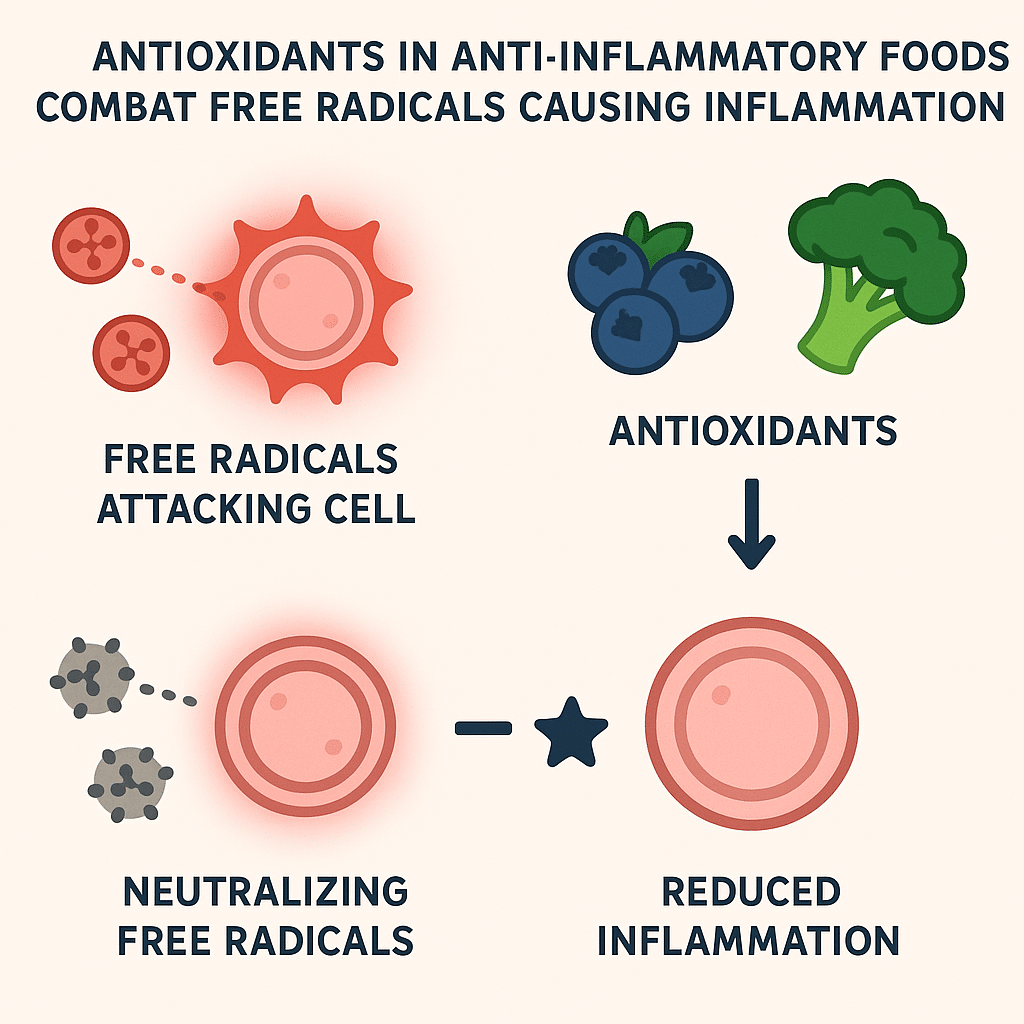
Easy Anti Inflammatory Foods Recipes for Everyday Meals
Integrating these foods doesn’t require gourmet skills. Here are a few simple ideas:
- Start your day with oatmeal topped with berries, flaxseeds, and a drizzle of honey.
- Swap regular salad dressing for extra virgin olive oil and lemon juice.
- Add turmeric and ginger to soups, smoothies, or teas.
- Grill salmon with a side of steamed broccoli and quinoa.
- Snack on nuts or dark chocolate before your afternoon slump.
- Brew a pot of green tea to sip throughout the day.
Combining Foods for Enhanced Anti Inflammatory Effects
Pairing certain foods enhances absorption and benefits. For example:
- Add black pepper to turmeric dishes to increase curcumin absorption.
- Combine vitamin C-rich citrus with iron-rich leafy greens for better nutrient uptake.
- Pair fatty fish with leafy greens for a balanced omega-3 and antioxidant boost.
Experiment with these combos for maximum anti-inflammatory impact.
The Role of Anti Inflammatory Foods in Managing Specific Conditions
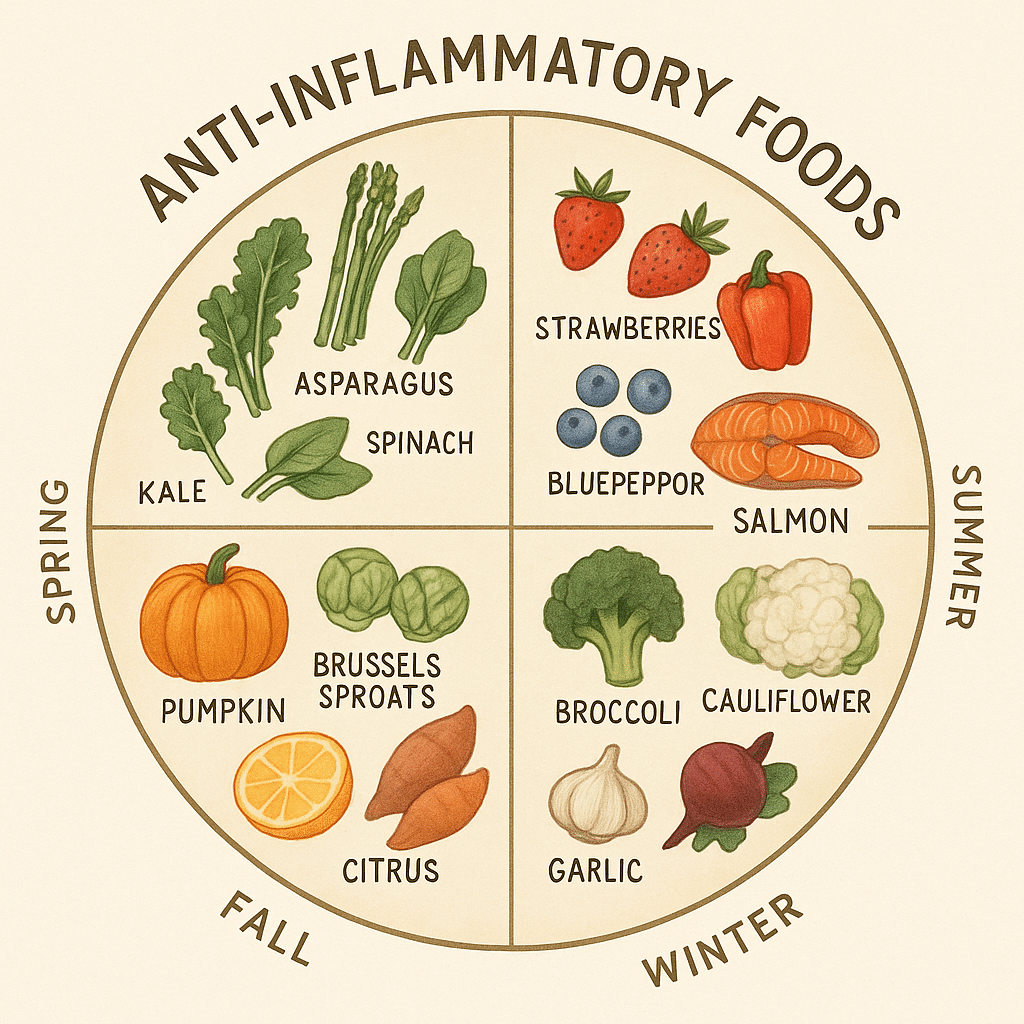
Best Anti Inflammatory Foods for Joint Pain and Arthritis
Joint pain and arthritis often stem from chronic inflammation, making diet a crucial management tool. Omega-3-rich fish, turmeric, ginger, and leafy greens help reduce joint swelling and stiffness, easing pain naturally.
Anti Inflammatory Foods for Heart Health and Cholesterol Management
Heart health benefits significantly from anti-inflammatory diets. Fatty fish, olive oil, nuts, whole grains, and green tea improve cholesterol profiles, reduce arterial inflammation, and lower cardiovascular risk.
Foods That Support Gut Health and Reduce Inflammation
Gut health is synonymous with overall health. Fiber-rich whole grains, berries, leafy greens, and fermented foods (not covered here but highly recommended) foster beneficial gut bacteria, which in turn modulate immune response and inflammation.
Foods to Limit: Avoiding Inflammatory Triggers
Processed Foods, Sugar, and Trans Fats
Processed snacks, sugary drinks, and trans fats are notorious for spiking inflammation. They increase oxidative stress and promote fat tissue inflammation, exacerbating chronic conditions.
Excessive Red Meat and Refined Carbohydrates
While modest red meat intake can be part of a balanced diet, excess consumption—especially processed meats—can increase inflammatory markers. Refined carbs like white bread and pastries cause rapid blood sugar spikes leading to inflammation.
Limiting these foods while focusing on natural, whole anti-inflammatory options is the smartest strategy.
Lifestyle Factors That Complement an Anti Inflammatory Diet
Physical Activity and Its Impact on Inflammation
Regular exercise reduces inflammatory markers and supports immune health. Even moderate activities like walking and yoga can help tame chronic inflammation.
Stress Management and Sleep Quality
Chronic stress and poor sleep drive inflammation. Mindfulness, meditation, and good sleep hygiene augment dietary efforts in controlling inflammation.
Frequently Asked Questions about Anti Inflammatory Foods
Can Anti Inflammatory Foods Reverse Chronic Inflammation?
While these foods can’t cure chronic diseases alone, consistent intake of the best anti inflammatory foods can significantly reduce inflammation and improve symptoms, often slowing disease progression.
Are Supplements Necessary Alongside Dietary Changes?
Supplements can help if dietary intake is insufficient, but whole foods provide a complex matrix of nutrients that supplements alone cannot replicate. Always consult your healthcare provider.
How Soon Can I Expect to Feel Benefits from These Foods?
Some people notice improvements within weeks, especially in energy and digestion, but significant changes in chronic inflammation usually take several months of consistent healthy eating.
What Are the Best Anti Inflammatory Foods for Seniors?
Seniors benefit from omega-3-rich fish, leafy greens, berries, nuts, and whole grains, which support joint, brain, and heart health—areas commonly affected by aging-related inflammation.
How Can I Use Natural Anti Inflammatory Foods and Spices Daily?
Incorporate spices like turmeric and ginger in your cooking, drink green tea, snack on nuts and berries, and choose olive oil as your primary fat source to enjoy daily anti-inflammatory benefits.
Key Points: Quick Takeaways
- Chronic inflammation is a silent contributor to many diseases but can be managed through diet.
- Omega-3 fatty acids, antioxidants, and polyphenols are key nutrients in anti-inflammatory foods.
- The top 15 best anti inflammatory foods include fatty fish, berries, leafy greens, nuts, olive oil, and turmeric.
- Combining these foods with a healthy lifestyle amplifies their benefits.
- Avoid processed foods, excessive red meat, and refined carbs to prevent inflammation spikes.
- Consistency is vital; benefits accrue with regular consumption over time.
- Anti-inflammatory foods support specific concerns like joint pain, arthritis, heart health, and skin condition.
Conclusion: Embracing a Natural Wellness Approach Through Diet
Navigating the path to reduced inflammation and better health doesn’t have to be complicated or restrictive. The best anti inflammatory foods provide a natural, delicious foundation for healing your body from the inside out. By making mindful choices—consistently favoring fatty fish over fried options, berries instead of sugary snacks, and leafy greens over processed meals—you empower your body to fight inflammation efficiently.
Remember, these foods are not magic bullets, but when combined with physical activity, stress management, and quality sleep, they form a comprehensive wellness strategy that supports longevity and vitality. So, why wait? Start weaving these nutrient-dense, inflammation-calming foods into your daily routine and take charge of your health with nature’s best remedies.
For more recipes and personalized anti-inflammatory diet plans, consider consulting registered dietitians or nutritionists who specialize in inflammation and chronic disease management. Your journey to natural wellness through diet is a worthy investment—one bite at a time.
Sources for further reading and product links are embedded throughout the article to ensure trusted and enhanced user experience.

